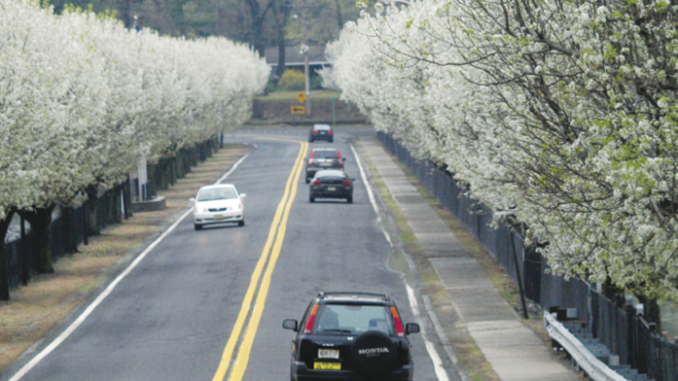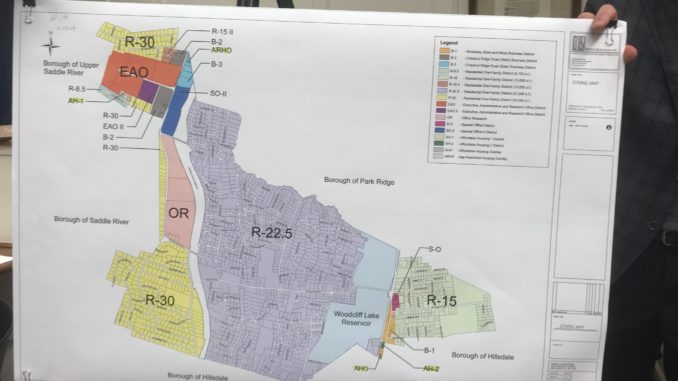
Council funds re-eval for a 10-year roadmap
WOODCLIFF LAKE, N.J.—With a proposal for a 60-unit multifamily development at 188 Broadway before the Zoning Board of Adjustment—and debate over future Broadway Corridor, town developments and affordable housing needs—the Borough Council on May 20 approved a $7,500 Master Plan re-examination by the borough’s planner.
Following the meeting, Borough Administrator Tomas Padilla said no timeline for a re-examination report was set.
The state requires a municipal Master Plan re-examination every 10 years.
According to Borough Attorney John Schettino, without such a reexamination towns leave their zoning open to challenge by another entity or developer.
Late last year the Council approved a study of Broadway Corridor’s design and permitted uses by Borough Planner Richard Preiss in hopes of setting future design standards “to create a more conducive downtown,” as Preiss noted at a recent meeting.
Councilwoman Angela Hayes also noted a Broadway Corridor design ordinance would be introduced at the June 3 meeting based on the $10,000 corridor study Preiss prepared.
Previously, Mayor Carlos Rendo argued the council would have been better served by spending money for a Master Plan update first before a corridor study.
Rendo only votes in case of a council tie vote.
‘No major changes’
Resident Ulysses Cabrera wanted to know if a re-examination meant the entire Master Plan could be changed and Schettino said though it’s possible it’s not likely to occur. Hayes said Priess agreed that “no major changes” would occur during a plan re-examination.
Hayes noted the reexamination is a first step and will help determine whether a “full-blown” Master Plan is needed, estimated at $50,000 to $75,000.
She said if a full Master Plan revision is found to be necessary, the council could budget for the cost next year.
A full Master Plan revision would take years, thus driving up its cost, said Hayes.
Borough Attorney John Schettino said Woodcliff Lake would be susceptible to legal challenges if the Master Plan is not re-examined every 10 years, as required by law.
He said it was important to revise the Master Plan to reflect local approvals and variances consistently granted to homeowners or businesses.
Re-exam ‘an insurance policy’
Councilwoman Jacqueline Gadaleta said that by passing a re-examination resolution “it almost serves as an insurance policy for the town. If a builder comes in and wants to do something that maybe our residents don’t truly want we could say, Well, look, we did not redo our Master Plan but we re-examined it and these are still our guidelines, what our residents want for our town and it serves as some sort of protection.”
Schettino said the re-examination helps “to actually protect the zoning you actually have in place.”
‘Corridor ordinance’ June 3
Padilla said once an ordinance on Broadway Corridor is introduced June 3, the public can comment then and comment when it goes to the Planning Board for a 45-day period comment period and also when it comes back to the council for a final public hearing.
The introduced ordinance is available online the next day on the borough’s website, said Padilla.
Hayes urged members to forward comments on the draft Broadway Corridor ordinance to the borough planner in advance of council’s June 3 meeting.
Preiss told council members April 15 that at previous community meetings to discuss Broadway Corridor ideas, community residents expressed a desire for low-density, residential, possibly single-family style uses which could include “retail uses to meet local shopping needs, and a place for people to meet, spend time and perhaps have a meal or a cup of coffee.”

B-1 zoning ‘very outdated’
He said April 15 that current B-1 zoning in part of the area is “very outdated” and may not be a sufficient inducement for development desired to transform the area.
He said one design vision included walking paths between retail/small business uses, with single-family residential buildings used by retail or restaurants and featuring a green front lawn.
Preiss noted the corridor is about a half-mile long, with Woodcliff Lake Reservoir to the west and railroad tracks along its length, anchored by the train station at its northern end.
He described the corridor, noting a “significant number” of single-family homes converted to other retail/commercial uses, a lack of sidewalks and fairly shallow lots on the east and west sides of Broadway.
“Development is lower intensity, fragmented,and single parcels are developed without consideration or connection with immediate uses connected to them,” Preiss said then. Preiss noted a 300-foot buffer to the reservoir as another “restraint” on development.
Spas, gyms, coffee shops
The borough planner’s preliminary study of Broadway Corridor design and permitted uses found that low-density residential building uses—such as spas, wellness facilities, gyms, coffee shops and restaurants—might help revitalize the corridor.
Zoning Board hearings for the proposed 60-unit development in two buildings at 188 Broadway have raised “quality of life” concerns about traffic congestion, public safety, lowered property values, and impacts of high-density overdevelopment on the borough.
Residents group Woodcliff Lake SHINE—Sharing Helpful Information Now for Everyone— attends proposal hearings wearing yellow “SOD” buttons, for Stop Over Development, and sponsors a website opposed to high density development.
